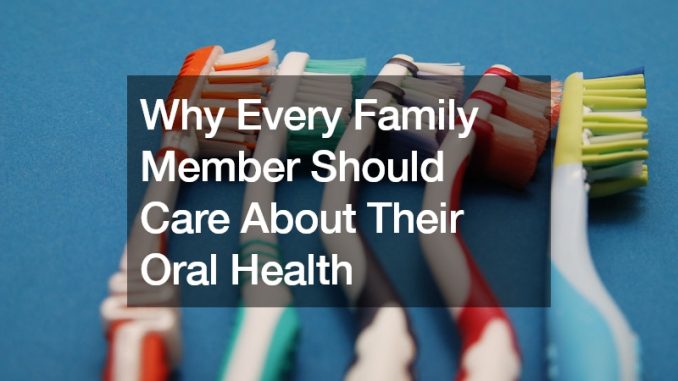

Maintaining good oral health is not just about having a bright smile; it’s crucial for overall well-being. Yet, many individuals, and sometimes entire families, neglect their oral health, often with serious consequences. The importance of oral hygiene extends far beyond just having a pretty smile; it impacts our ability to speak, eat, and even our overall health. Here’s why every family member should prioritize their oral health:
Prevention of Serious Health Issues: Oral health issues, when left untreated, can escalate into more severe problems. As mentioned in recent discussions, something as seemingly minor as a cavity can progress into an abscess, leading to hospitalization.
This escalation highlights the critical need for regular dental check-ups and prompt treatment of any issues detected by a family dentist.
Early Detection and Treatment: Regular visits to the family dentist every six months allow for the early detection and treatment of oral health issues. Gum diseases and cavities can be diagnosed and addressed in their initial stages, preventing them from progressing into more severe conditions that require invasive treatments or hospitalization.
Overall Well-being: Our oral health is closely linked to our overall health. Neglecting oral hygiene can lead to infections that may spread to other parts of the body, as mentioned in the discussions regarding the pandemic’s impact on dental health. Infections originating from untreated oral health issues can have serious consequences, including hospitalization and, in extreme cases, fatalities. Prioritizing oral health is, therefore, essential for maintaining overall well-being and reducing the risk of systemic health problems.
Family-wide Benefits: Good oral health practices benefit not only individuals but entire families. By instilling proper oral hygiene habits in each family member, such as regular brushing, flossing, and dental check-ups, families can collectively reduce their risk of developing oral health issues. Additionally, promoting a healthy oral hygiene routine among children sets them up for a lifetime of good dental habits, leading to better oral health outcomes in adulthood.
Safety Precautions at the Dentist: Despite concerns about safety during the pandemic, dental offices have implemented stringent safety measures to protect patients. These include screening patients before their visit, limiting capacity to maintain social distancing, and rigorous disinfection protocols. Some offices even utilize air-purifying filters in treatment rooms to further minimize the risk of infection transmission. These precautions provide reassurance to families about the safety of visiting the family dentist for routine check-ups and necessary treatments.
Early Intervention for Gum Diseases: Gum diseases, if left untreated, can lead to various complications, including tooth loss and bone damage. Regular visits to the family dentist enable early detection of gum diseases, allowing for timely intervention and treatment. With proper care and treatment, gum diseases can be managed effectively, preventing them from progressing to more advanced stages.
Promotion of Healthy Habits: Instilling good oral hygiene habits in children from a young age sets the foundation for a lifetime of dental health. Parents play a crucial role in teaching their children the importance of brushing, flossing, and attending regular dental check-ups. By modeling these behaviors and making oral health a priority within the family, parents can empower their children to take ownership of their dental care and prioritize their oral health as they grow older.
Enhancement of Confidence and Self-esteem: A healthy smile can boost confidence and self-esteem in both children and adults. When family members prioritize their oral health and maintain a beautiful smile, it positively impacts their self-image and social interactions. Conversely, oral health issues such as missing teeth, cavities, or gum disease can lead to embarrassment and self-consciousness. By investing in preventive dental care and addressing any oral health concerns promptly, families can enjoy the confidence that comes with a healthy smile.
Reduction of Long-term Health Care Costs: Neglecting oral health can result in significant financial burdens due to the need for extensive dental treatments and potential complications. Preventive dental care, including routine check-ups and cleanings, is far more cost-effective than treating advanced oral health problems. By prioritizing oral health within the family and investing in preventive care, families can minimize long-term dental expenses and maintain their financial well-being.
Preservation of Overall Quality of Life: Oral health directly impacts various aspects of daily life, including eating, speaking, and socializing. Untreated oral health issues can lead to discomfort, pain, and difficulty performing everyday tasks. By maintaining optimal oral health through regular dental care and preventive measures, families can preserve their overall quality of life and enjoy life to the fullest without being hindered by dental problems.
Long-term Health Benefits: Research has shown links between oral health and various systemic health conditions, including heart disease, diabetes, and respiratory infections. By prioritizing oral health within the family, individuals can reduce their risk of developing these serious health issues. Regular visits to the family dentist not only promote oral health but also contribute to overall health and well-being, leading to a healthier and happier family life.
In conclusion, oral health is a crucial aspect of overall well-being, and every family member should prioritize it. Regular visits to the family dentist, along with consistent oral hygiene practices, can prevent serious health issues, ensure early detection and treatment of problems, and promote overall health and well-being for the entire family. By making oral health a priority, families can enjoy the benefits of healthy smiles and improved quality of life.
.

Leave a Reply
You must be logged in to post a comment.